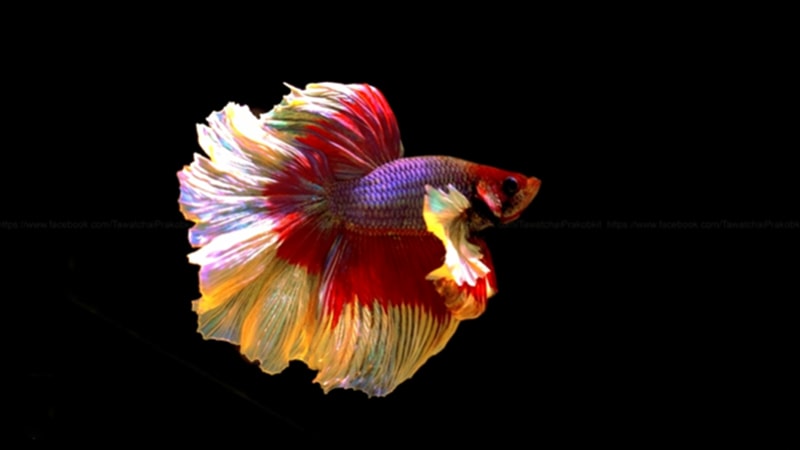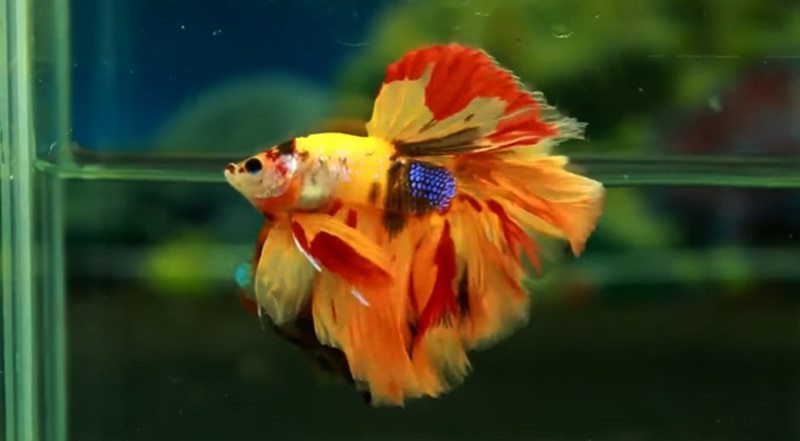If you’re looking for a way to get your betta fish to eat, you’ve come to the right place. We’ve all been there. When raising aquarium fish, many betta fish owners have experienced anxiety because their little guys are unwilling to eat, which can last for a few days. But don’t worry, especially if you are a newbie at raising betta fish, because this is a common situation, and you can completely handle it.
As you know, betta fish are one of the most popular aquarium fish in the world, which means the struggles of one owner are likely to be shared by many others.

In actuality, there are many answers to the question, “ Why is my betta fish not eating?”. But in this article, we’ll just discuss the five most common reasons why your betta fish might not be eating and give you ways to fix each problem.
Before making any conclusions, observe them closely
When you question, “why is your betta fish not eating?”. First, keep an eye on your betta fish’s behavior around feeding time if you suspect they are not eating and doing this a few times. Don’t forget to take notes of what you see, so nothing will get lost if you need to see a vet later. Before implementing any changes, you should confirm the existence of an issue. Since this might not be obvious to everyone, we need to clarify this section.
Is there a reason why we recommend repeating the above observation several times? Because you need to make sure that your fish are not eating at all or that they are still eating some of the food you give them. Maybe your little fish didn’t eat anything that time since you overfed them before…
Besides, depending on how long your betta fish hasn’t eaten, its condition may be serious. In the case of occasional meal breaks, it’s probably not a big deal, and the opposite is also true. In other words, if they consistently and regularly skip meals, then you have a problem. Some people don’t know that betta fish can be very capricious. For example, if you have recently changed something in their habitat or diet, that could be the reason why they stopped eating. When you start testing solutions, these details can be very helpful.
Why is my betta fish not eating?
Once you are sure that your little fish is having a problem, let us clarify what the cause of the problem is and how to solve it.
Low-quality food
A container of betta food will never be finished on time by any betta. The water-soluble vitamins in fish foods, including vitamin C, will start to degrade after about six months. In addition, food that is opened repeatedly each day becomes stale. On the other hand, betta fish use their sense of smell to find food, and old food does not smell good to them. Moreover, the nutritional value of old food has been lost, especially vitamins. Without immune-boosting vitamins C and E, your fish is significantly more likely to suffer secondary infections.
The recommended amount of pellets for your betta fish is two to four pellets once or twice a day. Pellets expand when they are submerged in water and are very filling for your fish. If your betta fish does not consume its pellets, you can replace them with freeze-dried or fresh food one to two days per week. If you don’t remove any excess food that your betta fish doesn’t eat, it will degrade water quality.

Water quality changing
Bettas are usually housed in smaller aquariums, so their water and tank can quickly become very dirty. Water that contains dirty or wasted materials can cause a spike in chemicals, including ammonia, within the water. These chemicals can cause serious health problems in fish. One of the first symptoms is a lack of appetite. Over time, these chemicals can lead to serious health problems.
Fortunately, the water quality problem is one of the simplest things to deal with. You can keep the water pristine by not overfeeding. Overfeeding causes waste to build up rapidly. Additionally, you can perform partial water changes weekly and scoop out any debris at the bottom of the tank. Aside from that, ensure that your tank has a filter, test your water quality regularly with a liquid-based test kit, and do regular maintenance, so your water quality parameters stay within normal ranges.
Unsuitable water temperature
Another reason to answer the question, “Why is my betta fish not eating?” is water temperature. As tropical fish, bettas prefer warm water, anywhere between 74 degrees Fahrenheit and 82 degrees Fahrenheit. This may not seem like a problem, but cold water can cause temperature shock, which is often fatal to bettas. If a betta fish’s water temperature falls below this, it may cause several problems, including slowed digestion and loss of appetite.
To solve this problem, you will need a heater for the tank first and keep your betta’s tank at 78°F or as close to it as possible. In smaller tanks, even if you live in a hot country, one cold night can drastically change the temperature.
Overfeeding
There are times when your fish is eating without you even realizing it. Some bettas have larger eyes than their stomachs and will happily consume anything in their tank. If their metabolism cannot keep up, food starts to build up and can cause serious GI distress. Overfed betta fish can develop severely distended bellies and will require immediate treatment.
It is recommended to feed your betta twice per day with a small amount of food each time: about as many pellets as the size of an eyeball. Uneaten food should be removed with a net or gravel vacuum.
Stress and Disease
If your fish skip meals for any reasons above, they are very likely stressed or ill.
In tanks with little hiding places or with too many fish, bettas can easily become stressed. A sudden change of scenery, bright lights, or too much activity can also make bettas nervous.
However, if your betta has been given the best care and housing, and you still cannot figure out what is wrong, you should contact a professional. Be especially careful if the fish exhibits other serious symptoms of illness, such as lethargy, color changes, severe fin damage, or scales that appear pine-cone-shaped.
FAQs
Why is my betta fish not active?
Stress, poor water quality, and illness may be among the reasons why your Betta fish is not active. While it can be disconcerting to discover that your betta fish is not moving, unless you know your fish is ill, it isn’t necessarily a cause for concern. And don’t be so anxious. Maybe your fish is just sleeping.
How long can a betta fish go without eating?
As we mentioned above, aquarium fish can survive for a few days without food. In the absence of food, betta fish can live for up to 14 days. However, Feed your fish on a regular and complete basis.
What to feed betta fish?
Actual betta pellets and flakes provide a balanced diet for your fish. Meanwhile, high-protein freeze-dried foods are another option for your betta fish when fresh food isn’t available. They are simple to measure out, preventing either overfeeding or underfeeding among your fish. Brine shrimp and bloodworms are among the meals available.
Video: WHAT TO DO IF YOUR BETTA ISN’T EATING
References:
https://www.thesprucepets.com/what-to-do-betta-fish-is-not-eating-5210883

Victoria has always loved pets. Watching the animals at the zoo was her favorite thing. Her first volunteer job was at the local animal shelter, Gateway Area Humane Society. It was fun to spend time with all the animals.
Victoria M. Pierce decided to pursue a career in veterinary medicine after high school. Victoria graduated from North Carolina State University with a degree in veterinary medicine. She has been a veterinarian for ten years. It’s her passion to help animals and make a difference in their lives.
Animal rights and welfare are Victoria M. Pierce’s passions. Victoria believes all animals deserve respect and compassion. As a veterinarian, she strives to provide her patients with the best care.